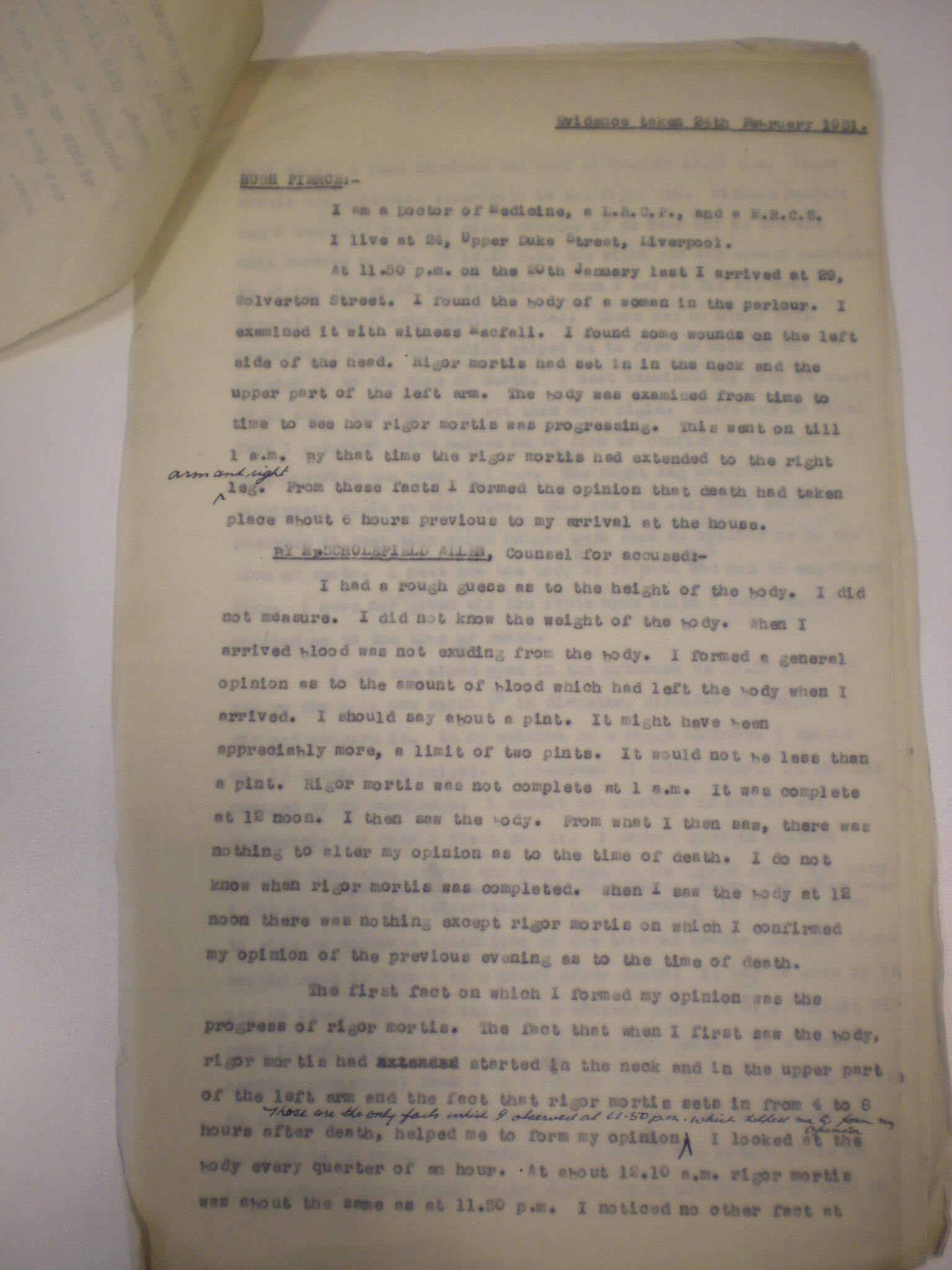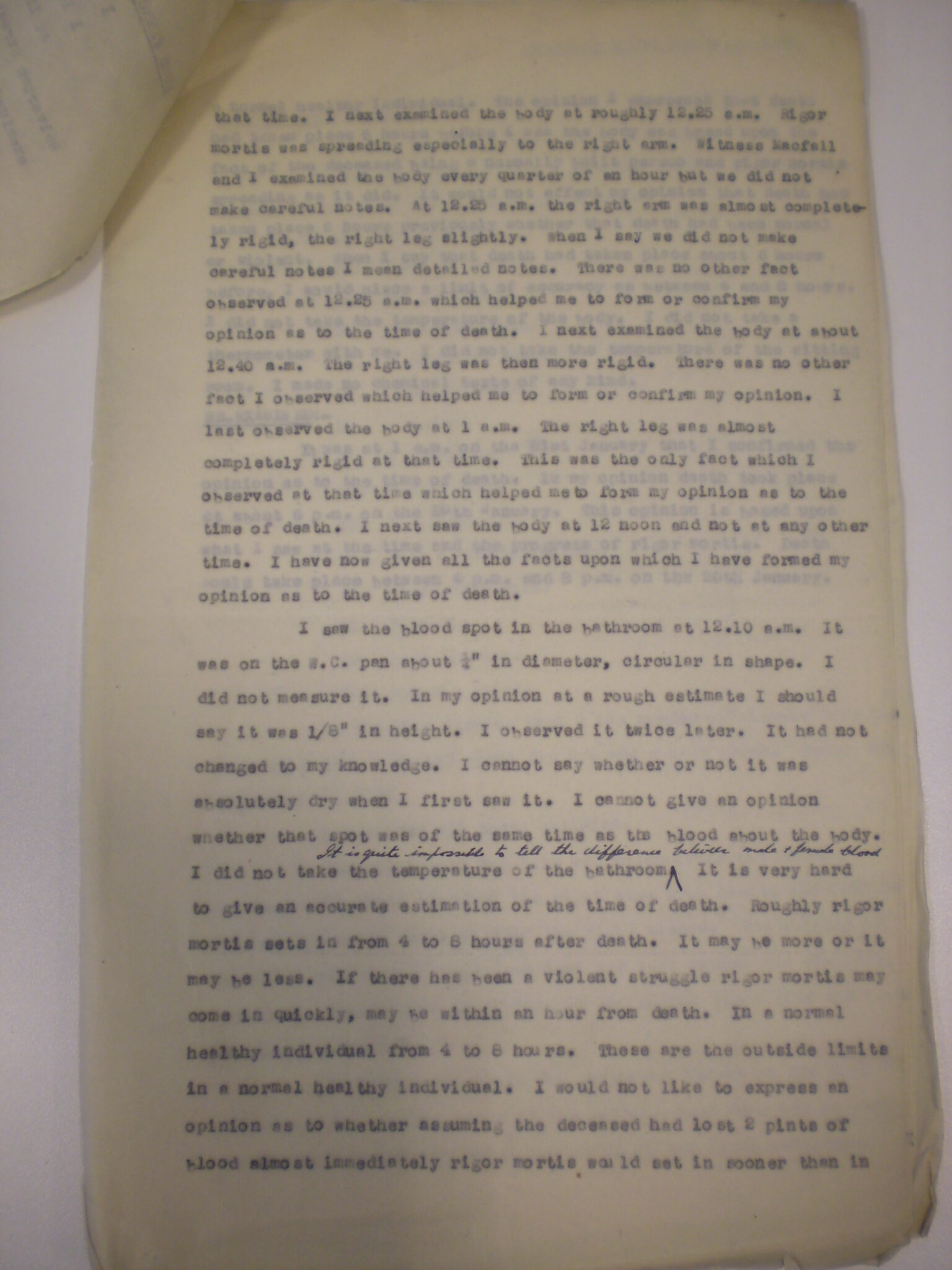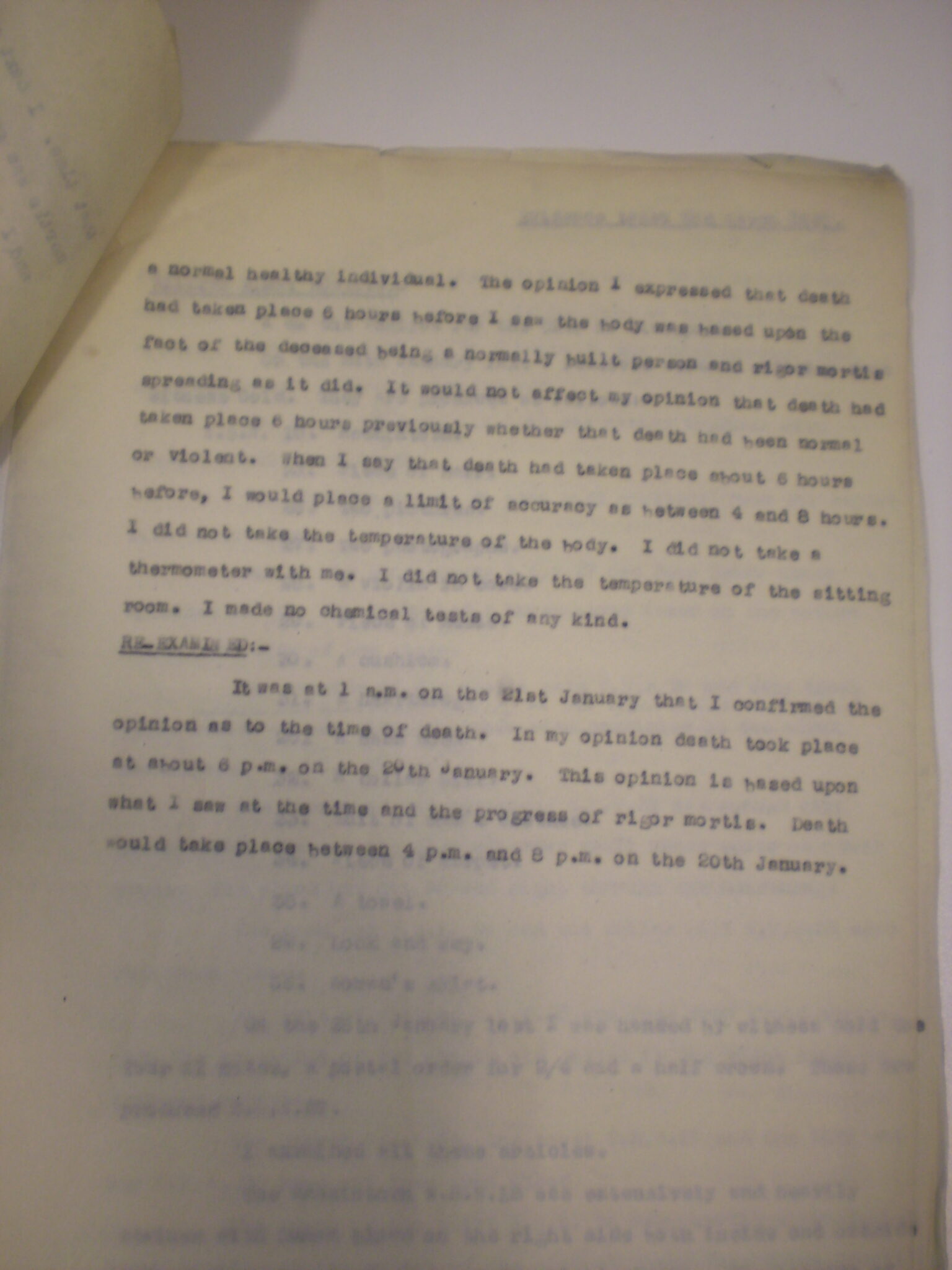Click Images to View in Full Size.
Main Trial:
Transcript (John Gannon):
DR HUGH PIERCE SWORN. EXAMINED BY MR WALSH.
2125. Your name is Hugh Pierce an you are a Doctor of Medicine. Yes.
2126. QLRCP and MRCS? Yes.
2127. You live at 34, Upper Duke Street, Liverpool? Yes.
2128. About 10 to 12 on this night, you went to 29 Wolverton Street? Yes.
2129. And you saw the body of the deceased woman? Yes.
2130. You saw the wounds in the head, I suppose? Yes.
2131. And you made a general examination? Yes.
2132. You were with the last witness, Professor MacFall? Yes.
2133. What conclusion did you come to as to the time of death? Well, the fact that the woman was cold in the arm, I found the rigor mortis was present in the neck and upper part of the left arm.
MR JUSTICE WRIGHT: This at 10 to 9?
MR WALSH: 10 to 12, my Lord.2134. MR JUSTICE WRIGHT: Rigor mortis in the neck, not just the upper part of the body? Yes.
2135. MR WALSH: What conclusion then did you come as to the time of death? Well, the fact that the hands and neck were cold proved to me that death had been some few hours previous to that.
2136. What do you mean by “some few hours”?
2137. MR JUSTICE WRIGHT: This is 10 to 12? Yes, my Lord.
MR JUSTICE WRIGHT: “Some few hours” means nothing. That may be 5, 6, 7 or 10. I do not know what that means.2138. MR WALSH: What do you mean by “some few hours”? Taking all things into consideration, I thought death had taken place about 6 o’clock, or, it may be, after.
2139. Did you examine the body subsequently? Yes, periodically.
2140. How often? Roughly about every quarter of an hour or 20 minutes.
2141. Did you note the progress of rigor mortis? Naturally, or course.
2142. You went in again at 12.25, I understand? Yes.
2143. What did you see then? Rigor mortis was very little different. The upper right arm was getting slightly more rigid.
2144. A little later, did you notice any difference? The lower part of the right arm had become rigid.
2145. Were they any other facts which helped you to judge the time of death? No, I simply went there to examine for rigor mortis because Professor MacFall asked me to.
2146. You simply took rigor mortis? Yes.
2147. As the rigor mortis progressed and you saw the body, did you come to any other conclusion than your previous one as to the time of death? No.
2148. MR JUSTICE WRIGHT: You mean you still thought it was about 6 o’clock or probably later? Yes, my Lord.
2149. MR WALSH: Can you say as to your limits? You can “about 6 o’clock” What limits on either side of that could you give? I would give two hours limit on either side.
2150. MR JUSTICE WRIGHT: It might have been between 4 and 8? Yes, my Lord.
2151. MR WALSH: Would you say that death could not possibly have occurred after 8 o’clock? I would say definitely it could not have occurred after 8 o’clock.
2152. Did you notice the physique of this woman? Yes.
2153. Would you say she was rather frail and small? No, she was a small woman but I thought with a perfectly healthy body.
2154. Would you say that rigor mortis would set in more quickly or less quickly in that case? Rigor mortis would come on in the normal way with this small woman.
2155. Just in the normal way? Yes.
2156. I think you saw the blood spot in the bathroom? Yes.
2157. Can you say when you saw it whether it was dry? About a quarter of an hour or 20 minutes after I went to the house, that would be about 20 past 12.
2158. What was it like then? Just a clot of blood.
2159. MR JUSTICE WRIGHT: You saw it about 20 past 12? Yes, my Lord.CROSS-EXAMINED BY MR ROLAND OLIVER.
2160. You never got to the house at all till 10 minutes to 12? No.
MR JUSTICE WRIGHT: I thought he said 10 minutes to 9. That has been puzzling me all the time.
MR ROLAND OLIVER: 10 to 12.
MR JUSTICE WRIGHT: I follow it now.2161. MR ROLAND OLIVER: You base your opinion as to the time of death on rigor? Yes and the cooling of the body.
2162. By the way, with regard to the cooling you did not take any temperatures, did you? I was not doing the examination.
2163. But you did not in fact? I did not.
2164. No temperatures were taken? No.
2165. You did know what is called the rectal temperature is generally considered the best test? Yes.
2166. That was not done? No, it was not done, I did not do it.
2167. With regard to your periodical observation with regard to rigor which took place every quarter of an hour, will you show me any notes you made? I was simply there by order of the Chief Constable. Professor MacFall was doing the examination.
2168. At any rate, you did not take any notes? No, I did not take any notes.
2169. I do not quarrel with you because you put your margin of hours either way? From 6 o’clock.
2170. When you say you think it was 6 o’clock, it might have been 4 o’clock in the afternoon or might have been later? And there were other factors as well.
2171. So far as rigor is concerned, it might have been as late as 4 o’clock or it might have been later? Yes.
2172. That seems a flimsy test on which to rely? I took the age of the woman into account. Extremes of age bring it on quicker. In middle age, it will come on from 4 to 6 to 8 hours after death and in a not too warm or cold room the extremities, the legs and arms were cold when I arrived. That meant that death with the cooling and the rigor would make it about 6 o’clock.
2173. When you say 6 o’clock, you have given a margin of error two hours either way? Yes.
2174. MR JUSTICE WRIGHT: I want to know what your view is in this case. You have said so many things it is difficult to follow what it is you have made or have not. So far you put it at 6 or perhaps later, but with a margin of error two hours either way which I thought referred to this particular case, otherwise what is the use of saying it. Yes, that is so.
2175. MR ROLAND OLIVER: The two hours margin of error refers to the case of this woman, does it not? Yes.
2176. You have sworn already? Yes.
2177. “When I say death took place about 6 hours before, I would place the limit of two hours from between 6 and 8”? Yes.
2178. So it follows she might have met her death at any hour within this time that night? Yes.
2179. With regard to your observations when you got there, you said that rigor was present in the neck and what else? The upper left arm.
2180. Do you know that is precisely the condition recorded by Professor MacFall two hours earlier? I do.
2181. It seems rather funny? I do not, if I may explain it in this way. When you move a muscle and rigor mortis is just starting, you make it limp and flaccid for a time, but if the muscle has not completely gone so that really it might start again, the rigor will come on definitely.
MR ROLAND OLIVER: I will leave it there, my Lord.




Nothing to do with the murder, but my cousin and his wife lived in Tyn Fynnon for a few years…